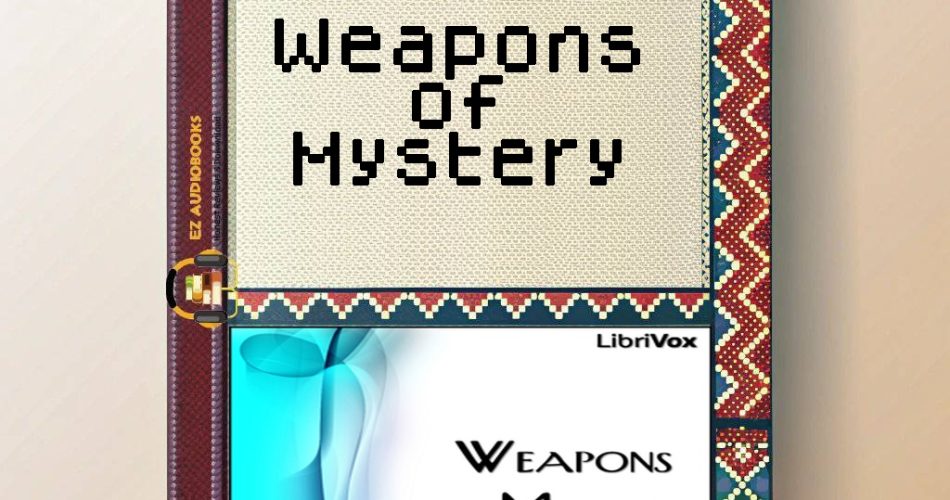Audiobook Sample
Listen to the sample to experience the story.
Please wait while we verify your browser...
- Title: Weapons of Mystery
- Author: Joseph Hocking
- Narrator: LibriVox Volunteers
- Length: 05:51:08
- Version: Abridged
- Release Date: 01/01/2017
- Publisher: LibriVox
- Genre: Fiction & Literature, Mystery, Thriller & Horror, Detective Stories, Action & Adventure
- ISBN13: SABLIB9785979
There’s something magical about discovering an old story that still carries the power to transport us. As I listened to “Weapons of Mystery” while riding a rickety train through the Scottish Highlands last winter – the frost painting ghostly patterns on my window – I felt that same thrill of discovery I’d known when first hearing Gabriel García Márquez in the Atacama. Joseph Hocking’s 1900 mystery novel, brought to life through LibriVox’s volunteer narration, proves some storytelling alchemy transcends time.
The story unfolds like a Victorian-era snow globe shaken to life: our earnest protagonist Justin Blake receives an unexpected Christmas invitation to Yorkshire, where a chance train encounter with the enigmatic Miss Forrest blossoms into instant infatuation. But this isn’t merely a holiday romance – soon we’re plunged into a battle against the sinister Herod Voltaire and his eponymous ‘weapons of mystery.’ The narrative moves with the brisk pace of a carriage changing horses, blending elements that will feel familiar to fans of Doyle’s detective stories or Haggard’s adventures, yet distinguished by Hocking’s particular preoccupation with moral clarity and spiritual undertones.
Listening to this audiobook, I kept remembering those storytelling nights in Oaxaca – how the grandmother would lower her voice to a whisper when revealing secrets. The LibriVox volunteers (particularly the primary narrator credited in this version) capture that same intentional rhythm. While the recording quality varies slightly – as expected with volunteer productions – there’s an authenticity to these readings that polished studio recordings sometimes lack. The narrator handles Hocking’s dialogue with particular skill, giving Herod Voltaire a silken menace that made me instinctively check over my shoulder during a lonely evening walk in Edinburgh’s Old Town.
Hocking’s prose offers fascinating glimpses into late Victorian anxieties. The ‘weapons’ in question aren’t merely physical – they represent the era’s growing tension between tradition and modernity, between spiritual certainty and technological advancement. Justin’s instantaneous devotion to Miss Forrest might strain modern credulity, but it perfectly encapsulates Victorian romantic ideals. Some passages made me chuckle with their earnestness (Justin’s internal monologues about protecting feminine virtue could fuel a drinking game), yet there’s undeniable charm in the novel’s wholehearted commitment to its moral universe.
The Yorkshire setting becomes a character itself – Hocking’s descriptions of moors and manor houses are so vivid I could practically smell the peat smoke and feel the winter chill, even while listening on a sunny Barcelona balcony. It reminded me of staying in a centuries-old guesthouse in Cornwall, where every creaking floorboard seemed to whisper secrets. This atmospheric quality translates beautifully to audio format, making it ideal for listening during travel or quiet evenings when you crave literary escapism.
Compared to similar works of the period, “Weapons of Mystery” lacks the psychological complexity of Wilkie Collins or the scientific rigor of early detective fiction, but compensates with pure storytelling verve. It’s the literary equivalent of a perfectly brewed cup of builder’s tea – comforting, bracing, and steeped in tradition. Modern listeners might need to adjust to Hocking’s narrative conventions (including some heavy-handed moralizing), but those willing to time-travel will find rewards in the novel’s unapologetic romanticism and pulse-quickening suspense.
For contemporary audiobook enthusiasts, this LibriVox edition represents both a gift and a minor challenge. The free accessibility is invaluable – I’ve added it to my ‘Literary Time Capsules’ playlist alongside other public domain gems. While you won’t find studio-quality production here, the occasional background noise and shifting vocal tones between chapters somehow enhance the experience, like listening to a beloved but slightly eccentric professor reading aloud by firelight. It’s particularly delightful for long train journeys, when the rhythmic clatter of tracks synchronizes with the story’s own momentum.
As someone who’s spent years collecting stories – both professionally and during chance encounters from Marrakech to Kyoto – I cherish discoveries like this. “Weapons of Mystery” won’t redefine your understanding of Victorian literature, but it will sweep you into its world with open arms. And isn’t that the magic we seek in stories? To be transported so completely that, for a few hours, Yorkshire’s winter winds feel more real than the world outside our headphones?
With ink-stained fingers and a suitcase full of stories,
Marcus Rivera

